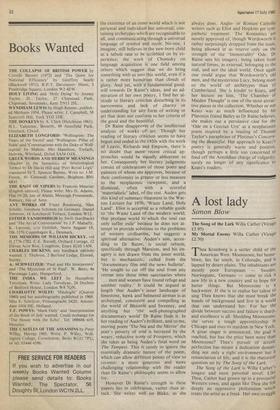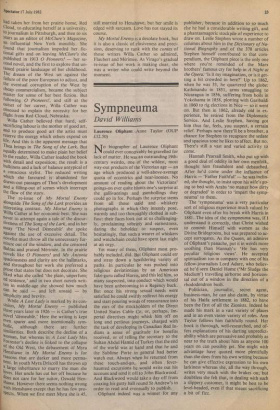A lost lady
Simon Blow
Thea Kronborg is a settler child of the American West. Moonstone, her home- Town, lies far south, in Colorado, and is lapped by desert plains. The inhabitants are mostly poor Europeans — Swedes, Nolivegians, Germans — come to risk a new life in a new country and to hope for better things. But Moonstone is a backwater. If she is to realise her talent 10 sing Thea knows that she must break the bonds of background and live in a world that can understand her. For her the divide between success and failure is sharp, and excellence is all. Shedding Moonstone, she serves a tough apprenticeship in Chicago and rises to stardom in New York. A great singer is announced, the goal is reached, but has the price been more than Moonstone? Thea's pursuit of artistic perfection has meant a dedication deman- ding not only a right environment but a renunciation of life, and it is the rhetorical question set by The Song of the Lark.
The Song of the Lark is Willa Cather's longest and most personal novel. Like Thea, Cather had grown up in a provincial Western town, and again like Thea she felt deeply an oppressive philistinism which treats the artist as a freak. Her own struggle
had taken her from her prairie home, Red Cloud, to educating herself at a university, to journalism in Pittsburgh, and then to six Years as an editor of McClure's Magazine, an influential New York monthly. She found that journalism impeded her fic- tional gifts and on leaving McClure's she Published in 1913 0 Pioneers! — her se- cond novel, and the first to explore that un- tamed prairie landscape of her childhood. The dream of the West set against the failure of the poor European to adjust, and the eventual corruption of the West by cheap commercialism, became the subject matter for some of her best fiction. But following 0 Pioneers!, and still at the outset of her career, Willa Cather was obsessed to explain the necessity for her flight from Red Cloud, Nebraska.
Willa Cather believed that hard, self- sacrificing labour is the mother of good art, and to produce good art the artist must reserve the energy which others expend on life. And this is the apparent message that Thea brings in The Song of the Lark. But equally determined to make plain her belief to the reader, Willa Cather loaded the book with detail and exposition; the result is a bulkiness and a lack of balance untypical of a conscious stylist. The reduced writing which she favoured is abandoned for drawn-out passages of Thea's development and a filling-out of scenes which interrupt the flow of the story.
The re-issue of My Mortal Enemy alongside The Song of the Lark provides an Interesting contrast. My Mortal Enemy is Willa Cather at her economic best. She was never to attempt again a tale of the discur- siveness of The Song of the Lark, and in her essay 'The Novel Demeuble' she spoke against the use of excessive detail. The novelist must throw all the unnecessary fur- niture out of the window, and she censored Elalzac and praised Merimee. In the prairie A
novels like 0 Pioneers! and My Antonia sPaciousness and clarity are the hallmarks, and throughout her work she preferred a prose that states but does not decorate. She liked what she called 'the plain, unperfum7 ed sentence,' and in two short novels writ- ten in middle-age she showed how much can be said — and left unsaid — by simplicity and brevity. While A Lost Lady is marked by its con- cision, My Mortal Enemy — published three years later in 1926 — is Cather's true novel `demeuble.' Here the writing is kept even sparer and more intentionally sym- bolic, although there are further similarities. Both describe the decline of a woman, but whereas in A Lost Lady Mrs Porrester's decline is linked to the collapse of the Old West, the debasement of Myra Henshawe in My Mortal Enemy is for reasons that are darker and more perma- nent. In youth Myra Driscoll has thrown up a large inheritance to marry the man she 1°ves. Her uncle has cut her off because he does not care for her suitor, Oswald Hen- shawe. However there seems nothing wrong with Henshawe except that he has few pro- spects. When we first meet Myra she is 45,
still married to Henshawe, but her smile is edged with sarcasm. Love has not stayed its course.
My Mortal Enemy is a desolate book, but it is also a classic of elusiveness and preci- sion, deserving to rank with the contes of those writers Willa Cather so admired, Flaubert and Merimee. As Virago's gradual re-issue of her work is making clear, she was a writer who could write beyond the moment.



































 Previous page
Previous page